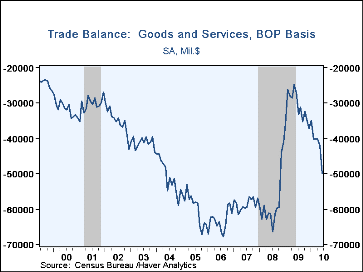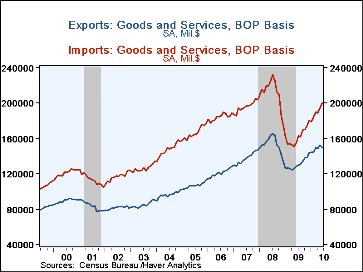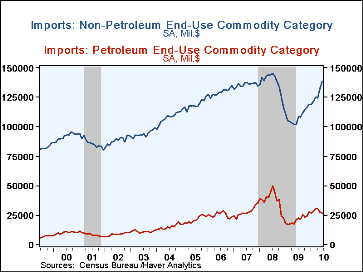 Global| Aug 11 2010
Global| Aug 11 2010U.S. Trade Deficit Deepest Since 2008
by:Tom Moeller
|in:Economy in Brief
Summary
Unexpectedly, the June U.S. foreign trade deficit deteriorated to $49.9B from a little-revised $42.0B in May. The combination of lower exports and higher imports brought the deficit to its deepest level since September 2008. The [...]
 Unexpectedly, the June U.S. foreign trade deficit deteriorated to $49.9B from
a little-revised $42.0B in May. The combination of lower exports and higher
imports brought the deficit to its deepest level since September 2008. The
deficit exceeded Consensus expectations for a deficit of $42.1B. For the
quarter, the deficit deteriorated also to its deepest since 4Q 2008. Trade's
estimated 2.8 percentage point subtraction from 2Q real GDP growth thus will be deepened
when the figures are revised later this month.
Unexpectedly, the June U.S. foreign trade deficit deteriorated to $49.9B from
a little-revised $42.0B in May. The combination of lower exports and higher
imports brought the deficit to its deepest level since September 2008. The
deficit exceeded Consensus expectations for a deficit of $42.1B. For the
quarter, the deficit deteriorated also to its deepest since 4Q 2008. Trade's
estimated 2.8 percentage point subtraction from 2Q real GDP growth thus will be deepened
when the figures are revised later this month.
The healthier U.S. economy prompted strength in nonoil imports, as it did in May. The 4.7% m/m increase raised them by more than one-third from last year. During June the gain was led by a 7.8% (26.4% y/y) increase in imports of nonauto consumer goods while auto imports rose 6.6% (81.7% y/y). Capital goods imports rose 1.2% (30.9% y/y) following two months of much stronger gains. Imports of foods, feeds & beverages rose 0.4% (13.6 y/y). Weakness in oil prices caused oil imports to fall 3.3% m/m but values still have risen by one-quarter since last year. Conversely, petroleum import volumes have risen 3.2% y/y. The per barrel cost of crude petroleum slipped to $72.44 (+2.4% y/y). Imports of services jumped another 1.7% (10.4% y/y) as travel imports rose 5.3% y/y. Passenger fares nudged up m/m to bring the y/y gain to 20.1%. Other private services imports including education services, financial services, insurance premiums and losses, telecommunications services and business, professional & technical services rose 10.7% y/y.
Weaker economies abroad caused a 1.3% decline in June exports though the weak value of the dollar helped them rise 17.7% y/y. Capital goods exports fell 3.8% (+17.6% y/y) while food exports dropped 3.9% (-5.5% y/y). Nonauto consumer goods exports nudged up just 0.9% (12.1% y/y) but auto exports jumped 2.5% (67.2% y/y). Services exports were strong again and posted a 0.8% increase (10.1% y/y). The lower value of the dollar encouraged visits to the U.S. and travel exports rose 13.8% y/y while passenger fares rose 17.0%. Exports of other private services rose 8.1% versus 2009.
By country, the trade deficit with mainland China deepened sharply to $26.2B, its deepest since October 2008. Trade with China surged as exports jumped roughly one-quarter y/y and imports rose more than one-third. The trade deficit with Japan deepened to $5.2B, nearly its deepest since December 2008. Imports rose by one-third y/y with U.S. economic recovery and exports rose by one-quarter. With the European Union, the trade deficit deepened to $7.8B, its largest in two years as exports rose 9.1% y/y but imports jumped 21.6%.
The international trade data can be found in Haver's USECON database. Detailed figures are available in the USINT database.
| Foreign Trade | June | May | April | Y/Y | 2009 | 2008 | 2007 |
|---|---|---|---|---|---|---|---|
| U.S. Trade Deficit | $49.9B | $42.0 | $40.3B | $27.1B (6/09) | $374.9B | $698.8B | $702.1B |
| Exports-Goods & Services (m/m) | -1.3% | 2.5% | -0.7% | 17.7% | -14.6% | 11.5% | 13.5% |
| Imports-Goods & Services | 3.0 | 2.8 | -0.4 | 29.9 | -23.3 | 8.0 | 6.3 |
| Petroleum | -3.3 | -9.0 | 0.3 | 24.8 | -44.0 | 37.0 | 9.4 |
| Nonpetroleum | 4.7 | 6.1 | -0.5 | 35.3 | -20.9 | 1.5 | 4.8 |
Tom Moeller
AuthorMore in Author Profile »Prior to joining Haver Analytics in 2000, Mr. Moeller worked as the Economist at Chancellor Capital Management from 1985 to 1999. There, he developed comprehensive economic forecasts and interpreted economic data for equity and fixed income portfolio managers. Also at Chancellor, Mr. Moeller worked as an equity analyst and was responsible for researching and rating companies in the economically sensitive automobile and housing industries for investment in Chancellor’s equity portfolio. Prior to joining Chancellor, Mr. Moeller was an Economist at Citibank from 1979 to 1984. He also analyzed pricing behavior in the metals industry for the Council on Wage and Price Stability in Washington, D.C. In 1999, Mr. Moeller received the award for most accurate forecast from the Forecasters' Club of New York. From 1990 to 1992 he was President of the New York Association for Business Economists. Mr. Moeller earned an M.B.A. in Finance from Fordham University, where he graduated in 1987. He holds a Bachelor of Arts in Economics from George Washington University.
More Economy in Brief
 Global| Feb 05 2026
Global| Feb 05 2026Charts of the Week: Balanced Policy, Resilient Data and AI Narratives
by:Andrew Cates








